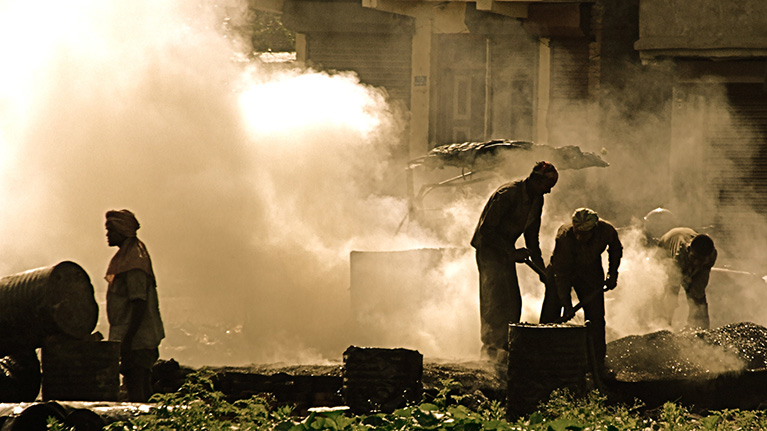by Dizzanne Billy – CNS Contributor
“Rastaman ah (is) the usual suspect.” – Prophet Benjamin
PORT-OF-SPAIN, Sep 01 2015 – Discrimination is everywhere in the Caribbean. But Carus John-Bejai is breaking the mold. At 23, this rastaman is flying through a PhD at the University of Nottingham, hoping to shed critical insight for Trinidad’s farmers in a changing climate.
Carus has always been intrigued by plants. Following the support from his parents, he began to see his love for plants as a way of “improving the living standards of not only those who rely directly on the sector but of the global population as a whole.”
Big words for such a young man, but he’s right. Winning the fight against climate change is critical to ending hunger around the world, especially across the Caribbean.
According to the National Oceanic and Atmospheric Administration, July 2015 was the hottest month ever. Even small increases in temperature and altered rainfall patterns are already having major impacts on people’s ability to provide food for their families.
Climate change threatens to impede upon any progress made in the eradication of hunger by decades and the global food system is not ready to handle this challenge. Carus’ dream is to be a plant breeder for tropical crops, and his passion is evident in the interview below. Given that climate change is already having severe impacts on the what, when, and how much of our consumption, it is particularly inspiring to see young Caribbean people standing ready as the technical minds behind solution-oriented approaches to the climate change/food security dilemma.
What does climate change mean to you?
To me, climate change is a very important topic for the Caribbean just as it is for the rest of the world. Climate change is represented by marked global increases in temperature, alternations in drought patterns, and soil salinisation, which is expected to have a dramatic impact on crop yields in the near future. As the climate changes then, it is expected that there will be negative effects on agricultural productivity.
This seems like a serious issue, what would you propose be done by the Caribbean Community (CARICOM) to propel climate change to the forefront of the minds of the average Caribbean citizen?
I think the introduction of environmental science courses in our schools has played a major role in improving our population’s understanding of anticipated changes to local climates and the potential effects they may have on our communities. I speak from experience here, as I was fortunate enough to have had the opportunity to undertake one such course during my time at secondary school. This demonstrates the value of educational programmes and public outreach towards achieving this goal.
The availability of food in the Caribbean is one dimension of climate change and food security. The direct link between climate conditions and food security worsens the state of the local agricultural sector and its domestic production of essential crops. As a result, the Caribbean is heavily dependent on food imports. In fact, the Caribbean region has a burdensome annual food import bill of US$4.75 billion and Trinidad and Tobago is the second highest importer of agricultural goods from outside the region.
From a technical perspective, what do you suggest be done to reduce regional and national dependency on food imports and build resilience against climate change?
We need to improve the efficiency of local production systems in light of climate change.
Climate change is expected to increase the frequency of severe weather events and is likely to further widen the yield gap of many crop species i.e. the inability to realise their true production potential. Additionally, with warmer temperatures we can anticipate that abiotic and biotic stresses will exert an even greater effect on local production; due to increases in the populations of biological pests and increased likelihood of drought events. I strongly believe development of stress tolerant cultivars that are better suited to our local environment is an area worth exploring. Our understanding of the physiological and genetic factors underlying tolerance to biological and environmental stress has greatly improved. We will need to select varieties with improved tolerance to drought, salinity and high temperature, traits that will inevitably be of value in improving the resilience of crops to climate change.
The Caribbean is vulnerable to severe weather events and climate change has increased the frequency and intensity of these. What are your thoughts?
I think cropping system inputs will need to be modified in response to climate change; alterations in fertilizer rates, altering the timing and quantity of water supplies, and selection of suitable cultivars will be required. The role of management in mitigating the effects of climate change has been demonstrated by the results of investigations into the response of wheat to elevated temperatures for instance, wherein tolerance to high temperatures was found to be influenced by soil water status i.e. well-watered plants were better able to regulate canopy temperature and thereby avoid the onset of heat stress. Management will also play a role in ensuring the sustainability of cropping systems, as factors such as sowing date and choice of crop rotation can potentially reduce erosion rates in instances where increases in precipitation are expected.
After speaking with this rastaman on the topic of climate change in relation to food security, I was left wondering about the local agricultural sector. It needs more attention. Farmers play such an important role and they need support as climate change effects continue to show up at our front doors, and not with a smiling face.
Projects such as Carus’ are exactly what we need to conduct in Trinidad and Tobago and the Caribbean, particularly in terms of developing a plan for adaptation of the food and agricultural sector in response to changing climatic conditions. In addition, investment in technology is needed to realise desirable levels of crop production to support the nation’s food needs. As Carus emphasised, “while crop management and breeding can play a role, continued investment and research into areas such as post-harvest management and the economic factors related to crop production is mandatory, particularly in light of the challenges that will be imposed by climate change.”
We need to realise the dire impacts of climate change on our ability to sustain ourselves. In a report, Oxfam calls on governments and private businesses to take action now to slash emissions and help protect food systems from the ravages of extreme weather. Without immediate action, these impacts will only worsen.
(Dizzanne Billy, 24, operates in the role of President of the Caribbean Youth Environment Network (CYEN) in Trinidad and Tobago, where she works in the areas of education and public awareness with regard to environment and development issues. She is a climate tracker with Adopt-A-Negotiator and a young advocate for climate change action.



